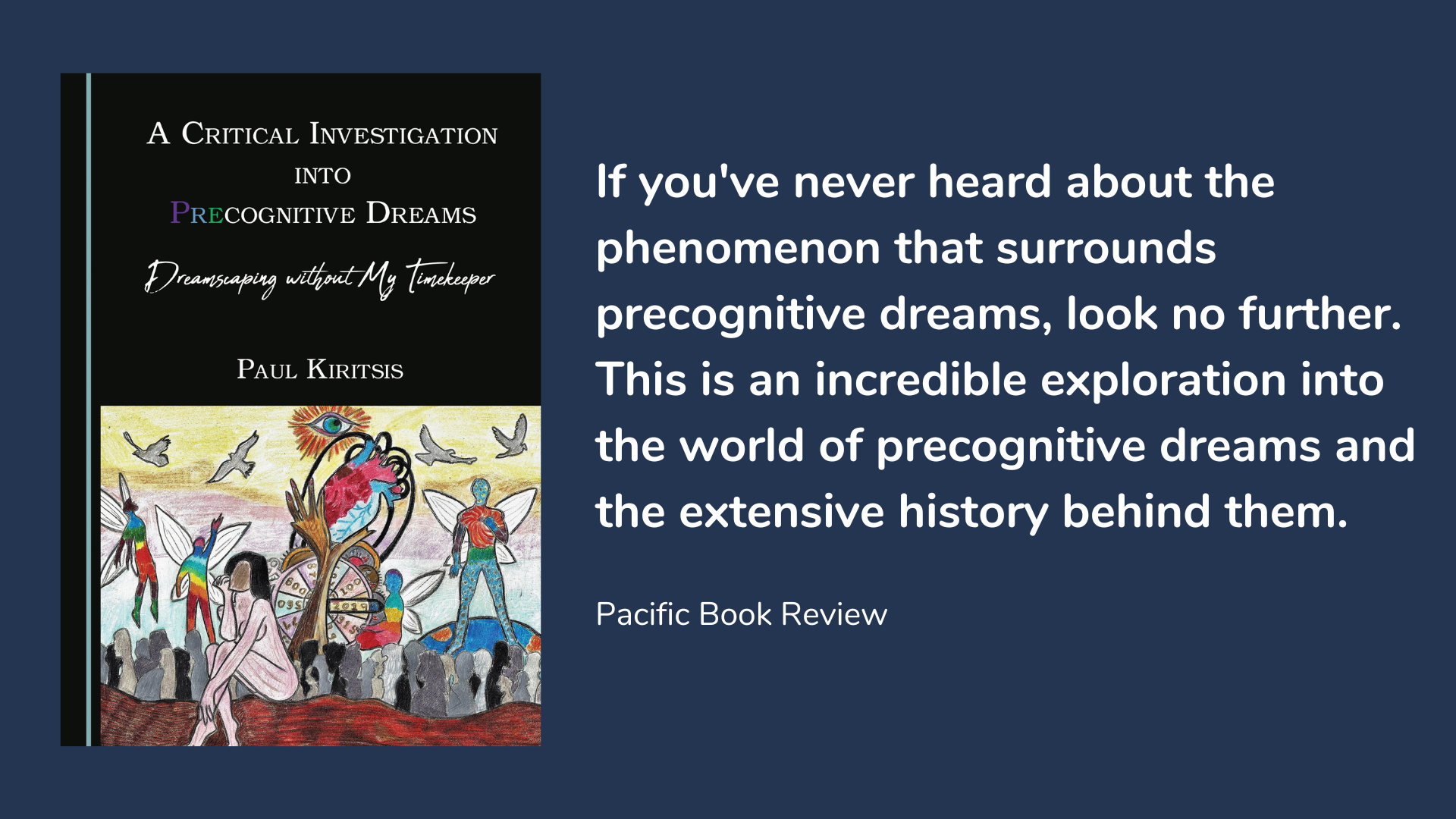A Critical Investigation into Precognitive Dreams: Dreamscaping without My Timekeeper
Paul Kiritsis, PsyD, MScMed
The precognitive dream is a compelling, real-world phenomenon that still stands outside the purview of orthodox science. It is spoken about anecdotally and has been alluded to time and time again by renowned psychiatrists, psychologists, neurologists, and other clinicians expounding upon the nature of their patients narratives. However, it receives no empirical airtime because it is incommensurable with conventional explanations of human consciousness like the embodied mind hypothesis and with unconscious philosophical attitudes espoused by disciples of an ostensibly irrevocable Cartesian-Kantian account of the cosmos.
This volume examines precognitive dream experiences, offering a comprehensive source of integrated information pertaining to their history and overarching features, their potential neural underpinnings, and the implications for consciousness and competing philosophical theories of determinism and non-determinism. It will serve as a useful reference for both researchers and clinicians hoping to gain insight into an age-old, sublime phenomenon.
Praise for A Critical Investigation into Precognitive Dreams
While the marketplace is saturated with plenty of books on dreaming, dream interpretation, and interpretation of symbols and artifacts that are present in dreams, Kiritsis’ book is unique in that the focus is specifically on the study between events, objects, people, conversations, etc. that people have reported having dreamt about, with a later manifestation of the same phenomena in waking, day-to-day life. Kiritsis has dedicated his research to such precognition dreaming, and the resulting book, without doubt, provides a unique, well-researched academic study of this most interesting of windows into the human psyche.
- Jonah Meyer, The US Review of Books
Dreams about future events have been a source of speculation for millennia. In his book A Critical Investigation into Precognitive Dreams: Dreamscaping without My Timekeeper, Paul Kiritsis summarizes what is known and what is speculated about this fascinating topic. Kiritsis writes in a reader-friendly manner, but does not refrain from addressing the key issues involved, whether they be the role of coincidence or the debate between free will and determinism. Even if you think you know this subject matter well, you are bound to discover historical events, research results, and anecdotal material that you never knew existed.
- Stanley Krippner, PhD Co-author, Dream Telepathy; co-editor, Varieties of Anomalous Experience
Paul Kiritsis’ A Critical Investigation into Precognitive Dreams: Dreamscaping without My Timekeeper dances between scholarly research and playful storytelling of anomalous phenomena and extraordinary dreams. Kiritsis addresses a fascinating subject with engaged enthusiasm and descriptive acuity that both informs and entertains. The subject of extraordinary precognitive dreams is not often addressed this deeply, with chapters that cover significant ground in science, philosophy, astronomy, and the human mystery. If you are interested in a scientific conversation about dreams, time, space, and paradoxes, all with creative artwork demonstrating the ideas Kiritsis shares like a passionate discussion in a coffeehouse without laptops, the first chapters of this book will not disappoint. Finally, Kiritsis presents his own (2014) quasi-experimental investigation (n=15) into precognitive dreaming. After discussing personal vs. collective types of precognitive dreams, he gives examples of participants’ dreams alongside their waking life notes. These dreams and Kiritsis’ discussion around their potential levels of precognition (excellent, good, or average) are rich and interesting to consider. At the end of the book he sends his readers off with final thoughts about precognitive dreaming and the tension between fate and free will. In addition to critical investigation, this book is also a creative resource to add to the growing body of extraordinary dream literature.
- Angel Morgan, PhD, President, International Association for the Study of Dreams
This is an incredible exploration into the world of precognitive dreams and the extensive history behind them. Written by scholar and doctoral graduate in clinical psychology Paul Kiritsis, this book delves into the complicated and astounding nature of precognition and precognitive dreams, in particular, and how psychology goes hand in hand with this occurrence. […] Each page will leave you with questions which you’re eager to explore the answers to, as you continue on this journey of precognition. […] I have always had a love for psychology, myself, and found both the science and unexplainable aspects of precognitive dreams to be absolutely intriguing. I kept wanting to learn more about the subject and A Critical Investigation into Precognitive Dreams does a fantastic job of covering this psychological phenomenon. It is the perfect follow-up to his 2014 book, as it further delves into this subject that is not understood enough—yet. Make sure to grab your copy of this book today!
- Aly Avina, Pacific Book Review
A Critical Investigation into Precognitive Dreams is available to buy from your local bookseller and online internationally from Amazon.
About The Author

Dr. Paul Kiritsis, PsyD, MScMed, is a licensed medical psychologist practicing in Redwood City, California. He specializes in the diagnosis and multimodal treatment of neuropsychiatric and functional neurological disorders, as well as coordinating care for patients suffering from these ailments. He offers heterogeneous and eclectic services consistent with his interdisciplinary training in clinical psychology and medicine (clinical neurology and neurophysiology), including, (1) comprehensive neuropsychological evaluations for diagnostic clarification, formulation of rehabilitation plans, and treatment guidance, (2) integrated psychophysical and neuropsychological assessments for the early detection of underlying neurodegenerative disease processes, (3) adult and young adult psychotherapies, (4) ecologically oriented neurorehabilitation of executive function and memory for individuals with psychiatric and/or neurological disease or injury, and (5) clinical hypnosis for adjuvant treatment of pain disorders [e.g. post-stroke, migraine, cluster headache, and cancer patients], manifest phobias and panic symptoms, smoking cessation, and enhancement of creativity."
Dr. Kiritsis has authored six other books, including Tales of a Spiritual Sun (2023), the creative compendium Confessions of a Split Mind (2017) and a work on the intersection of creativity and disorder entitled The Creative Advantages of Schizophrenia: The Muse and the Mad Hatter (2019). His diverse academic interests straddle cognitive neuroscience, clinical neuropsychology, and philosophy of mind at one end of the spectrum and esotericism, comparative religion, history, and mythology at the other.
You can learn more about the ground-breaking work of Dr. Paul Kiritsis by visiting his website paulkiritsis.net and you can connect with him online via Twitter, YouTube and LinkedIn.
Know Someone Who Would Love To Read: A Critical Investigation into Precognitive Dreams?
Share This Page With Them.





